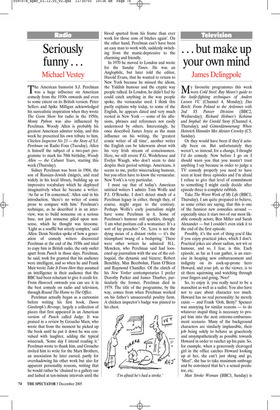Seriously funny . . .
Michael Vestey
The American humorist S.J. Perelman was a huge influence on American comedy from the 1930s onwards and even to some extent on its British version. Peter Sellers and Spike Milligan acknowledged his surrealistic inspiration when they wrote The Goon Show for radio in the 1950s; Monty Python was also influenced by Perelman. Woody Allen is probably his greatest American admirer today, and this week he presented his own tribute to him, Chicken Inspector No 23 — the Story of S.J. Perelman on Radio Four (Tuesday). Allen is himself the subject of a two-part programme to mark his 70th birthday, Woody Allen — the Cabaret Years, starting this week (Thursday).
Sidney Perelman was born in 1904, the son of Russian–Jewish émigrés, and read widely in his local library, building up an impressive vocabulary which he deployed imaginatively when he became a writer. ‘As far as I’m concerned,’ Allen said in his introduction, ‘there’s no writer of comic prose to compare with him.’ Perelman’s technique, as he described it in an interview, was to build nonsense on a serious base, not just nonsense piled upon nonsense, which he thought was tiresome. ‘Light as a soufflé but utterly complex,’ said Allen. Denis Norden spoke of how a generation of comedy writers discovered Perelman at the end of the 1930s and tried to copy him in British radio, the only outlet apart from Punch in those days. Perelman, he said, took for granted that his audience were intelligent, and so when he and Frank Muir wrote Take It From Here they assumed an intelligence in their audience that the BBC had been reluctant to give it credit for. From Hancock onwards you can see it in the best comedy on radio and television, through Round The Horne to The Office.
Perelman actually began as a cartoonist before writing his first book, Dawn Ginsbergh’s Revenge, largely a collection of pieces that first appeared in an American version of Punch called Judge. It was praised in a review by Groucho Marx, who wrote that from the moment he picked up the book until he put it down he was convulsed with laughter, adding the typical wisecrack, ‘Some day I intend reading it.’ Perelman wrote to thank him, and Groucho invited him to write for the Marx Brothers, an association he later cursed, partly for overshadowing his other work but also for apparent personality reasons, writing that he would rather be ‘chained to a gallery oar and lashed at ten-minute intervals until the blood spurted from his frame than ever work for those sons of bitches again’. On the other hand, Perelman can’t have been an easy man to work with, suddenly switching from the manic-depressive to the charming and friendly.
In 1970 he moved to London and wrote for the Sunday Times. He was an Anglophile, but later told the editor, Harold Evans, that he wanted to return to New York because he missed the idiom, the Yiddish humour and the cryptic way people talked. In London, he didn’t feel he could catch anything in the way people spoke, the vernacular used. I think this partly explains why today, to some of the English, he appears dated and very much rooted in New York — some of his allusions, phrases and references not easily understood by others. Interestingly, he once described James Joyce as the main influence on his writing, the ‘greatest comic writer of all time’, another writer the English can be lukewarm about with his very Irish stream of consciousness. Here, we still revere P.G. Wodehouse and Evelyn Waugh, who don’t seem to date despite their period settings. Americans, it seems to me, prefer wisecracking humour, but you often have to know the vernacular. New York’s is very particular.
I must say that of today’s American satirical writers I admire Tom Wolfe and P.J. O’Rourke. I don’t detect much of a Perelman legacy in either, though they, of course, might argue to the contrary. Perhaps Wolfe’s early journalism might have some Perelman in it. Some of Perelman’s humour still sparkles, though: ‘I am what puritans call a womaniser. It’s a sort of lay preacher.’ Or, ‘Love is not the dying moan of a distant violin — it’s the triumphant twang of a bedspring.’ There were other writers he admired: H.L. Mencken, who Perelman said had loosened up journalism with the use of the colloquial, the dynamic and bizarre; Robert Benchley, Max Beerbohm, Flann O’Brien and Raymond Chandler. Of the clutch of his New Yorker contemporaries I prefer Dorothy Parker and James Thurber, particularly the former. Perelman died in 1979. The title of the programme, by the way, comes from when Perelman worked on his father’s unsuccessful poultry farm. A chicken inspector’s badge was pinned to his chest.



























































 Previous page
Previous page